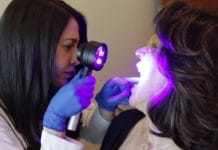As a dental hygiene graduate, Sara Taft, MSAH, RDH, thought clinical dental hygiene would be her forever job. However, after a couple of years, she wanted to expand her career possibilities. A coworker encouraged her to continue her education.
Three years after starting clinical practice, she made the pivotal decision to pursue her bachelor’s degree in dental hygiene. The decision sparked some twists and turns that eventually inspired Upscale Assessment, a grading software for dental hygiene programs.
Based in the Milwaukee, Wisconsin area, Taft discussed her creation of Upscale Assessment, a web-based grading software tailored for dental hygiene education.
Today’s RDH: How did your education culminate and lead you to becoming a dental hygiene educator?
Taft: I completed my teaching capstone in education at my alma mater, Waukesha County Technical College (WCTC). That’s when I fell in love with teaching. I was hired as an adjunct faculty at WCTC while completing my master’s degree. I graduated with a master’s of science in allied health with a concentration in education and administration.
I wanted to diversify in case I ever wanted to expand past the dental hygiene program and have some flexibility.
Eventually, I was hired as a full-time faculty member, teaching clinical, oral anatomy, and periodontology and facilitating second-year clinicals.
Today’s RDH: What was the next step for your career?
Taft: A couple of years later, the Wisconsin Dental Hygienists’ Association advocated for expanding dental hygienists’ role in access to care. In 2017, Wisconsin passed a bill allowing dental hygienists to provide mobile dentistry to at-risk populations.
I applied for the mobile license and began providing care in memory care facilities. I purchased a portable piezo unit, and off I went, serving several memory care facilities in Waukesha County. I loved my time providing care to those who were not able to leave the facilities easily.
However, my full-time teaching position workload made balancing those two career paths difficult. After several years of providing this service, a graduate of mine had the inspiration to start her own mobile business and could provide more access to care than I was able to. So, I transitioned out of that role.
My next adventure was co-founding a consulting and training business with a fellow educator. Post-COVID, we felt that face-to-face continuing education opportunities were limited. Dental hygienists who graduated before obtaining specialized licenses and certifications were limited in obtaining those credentials, so we are trying to bridge that gap. We are AGD PACE-approved and focus most of our training and consulting in Wisconsin.
Today’s RDH: Where did the idea for Upscale Assessment come from, and how did you bring that idea to life?
Taft: At WCTC, I spent almost 10 years as a clinical facilitator before becoming the program director. After the winter term in 2022, I reflected on the semester. I felt our dental hygiene program needed software that could be customized to our program. We wanted software that showed our students real-time, individualized grading and progress through the curriculum. We also wanted a grading scale that could be customized to what and how we assessed our students.
Even though all programs are CODA accredited, we all assess our students differently and need software that can be customized to our needs. Most importantly, we wanted student-focused software that helps identify when students need more one-on-one support earlier as they develop their clinical skills. That is when the idea for Upscale Assessment was created.
While attending the WCTC graduation ceremony in December 2022, a group of students walking across the stage were receiving their degrees in software development. Shortly after that ceremony, I contacted the program director of the software development program to see if the students could help me create software as a class project.
After meeting with their program lead and learning it would take years to develop the software, I asked her if she had any connections who might be interested in a new venture. That is when I was connected with Jeff Nelson, a software engineer who helped me develop the software. Jeff has a background in higher education and had the forethought to make Upscale Assessment customizable to each dental hygiene program.
Jeff and I initially met over a 30-minute online meeting, and right away, he said yes after I explained the problem and opportunity to him. We started meeting online every week and continue to email daily and meet online every other week. Jeff only lives about one hour from me, but surprisingly, we have never met face to face while we developed the software. We plan on meeting face-to-face for the first time this upcoming summer.
Today’s RDH: Tell us about what Upscale Assessment offers.
Taft: All dental hygienists who graduate from a CODA-accredited program and pass their boards can apply for a dental hygiene license. Part of the accreditation process involves dental hygiene programs proving that students meet specific requirements or experiences, such as working with a variety of patient experiences, patients with moderate to severe periodontal disease, calculus classifications, and radiographic experiences.
Upscale Assessment is designed to track all these requirements but still has the flexibility to modify many aspects, including grading and process evaluations for each program. It gives students transparency regarding grading, self-assessment, remediation protocols, and tracking requirements.
For faculty, it is an intuitive software to track cohort requirements and calibrated remediation protocols, leading to less workload time spent searching completed requirements.
Today’s RDH: How will Upscale Assessment be launched?
Taft: With the support of WCTC, we have piloted the software in our dental hygiene program for the last year. Even though we developed it before we started using it at WCTC, the feedback from the faculty and students was invaluable.
Most of the feedback was based on how the reports were run, the ease of viewing them, and what else the students wanted to see from their perspective. We posted some of their thoughts and feedback on the home page of our website under “Why people believe in us.”
Comments from faculty are also on there. They found that their workload was greatly reduced, and they were less stressed. This year, we will start offering it to other colleges. This has been an exciting year connecting with so many programs across the United States and even internationally.
Today’s RDH: What advice do you have for other hygienists who may see a need for something and have an idea but don’t know where to start?
Taft: Believe in yourself and go for it! As dental hygienists, we have grit. We made it through dental hygiene school and are a smart demographic of people. We all have ideas, but it takes grit and ambition to take it to the next level.
Dental hygienists are a tight-knit, supportive group. I truly believe we all want to see others succeed. Asking for help and guidance is essential to being successful. Also, understand there are going to be challenges and that it takes hard work to be successful, but it is worth it and rewarding to see how your idea can help other dental hygienists.
Today’s RDH: Going back to when you thought clinical hygiene would be your forever job, is that where your passion still lies? Is there anyone you’d like to thank for their support throughout your career?
Taft: Through all my endeavors, clinical dental hygiene is still the foundation of my passion for the profession. I have still practiced with dedication and commitment in the same private dental office for over 20 years.
I am thankful for so much in my career: The advocacy of the ADHA and WDHA, the support from colleagues, WCTC, mentors, students, and my family, and the ambition to create something that will be meaningful to others in the dental hygiene profession.











